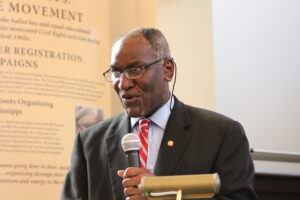Thursday night, the Chancellor’s Advisory Committee for Historical Context and Contextualization held a listening session at Burns-Belfry Museum in Oxford to hear members of the Ole Miss and Oxford communities voice opinions before the committee makes recommendations to Chancellor Vitter.
The focus of the discussion was the seven sites on the Ole Miss campus set to be contextualized. As previously reported the sites are Lamar Hall, Barnard Observatory, Longstreet Hall, George Hall, and a group of 4 antebellum sites (Barnard Observatory, Croft, Lyceum, and Hilgard Cut). The only building set to be changed completely is Vardaman Hall, after the Committee, and Chancellor Vitter deemed it to be a more extreme case. Vitter spoke about how he feels that contextualization is a better option in other cases. He said that as a general principle, he does not think the first step should ever be to remove or replace something.
“We left the Confederate statue, but we contextualized it, and I think that’s far preferable than removing it as some cities have done, which I think is wrong,” Vitter said. “There is one exception, which is so extreme that a rename is in order, but generally, I believe that contextualization is the right way to do it.”
The meeting was the second of its kind, with the first one having taken place on March 6 on campus. Vitter noted that this meeting was focused on phase two of the process; determining how best to contextualize those seven sites.
“We have a committee of experts, and I’ve made it clear to the committee of experts, it’s very important for them to listen and engage in constructive conversations with all university stakeholders. That’s students, faculty, staff, alumni, friends, community members so that we don’t miss anything and we weigh all relevant information.” Vitter said. “Tonight we are in phase two of the mission, which is input into the aspects of the seven sites that the committee should not miss but take into account to help them craft the final way of contextualization.”
Before he left, Vitter once again clarified that “Ole Miss” and “Rebels” are not being discussed by the committee and will continue to be used.
Before the Q&A portion of the meeting, Dr. Charles Ross, Director of African-American Studies, gave a presentation outlining the reasons for each site’s contextualization.
“The achievements of these people who these buildings were named after must not be understated or overstated. Personal modern day opinions and prejudices are not necessary and are not applicable to explain the facts of their time. If we let the events of the past dictate the decisions of the present, our future will be lost. We are all entitled to our own opinions, but we are not entitled to alter the facts of history.” Richard Noble, a 1968 Ole Miss alum, said.
Allen Coon, author of the ASB state flag resolution, talked about his stance on the committee’s efforts and suggested that they take further steps to honor other aspects of Mississippi history.
“I would never suggest that contextualization is enough. I’m of the opinion that we shouldn’t continue to honor public white supremacists. I do believe that this process is important for us to have a dialogue that historically has not occurred in our community. There’s much more to Mississippi than white supremacy, and I think we should take efforts to honor the aspects of our state that we can all be proud of,” Coon said.
Next to speak was Steve Vassallo, whose deep ties to Ole Miss led him to discuss the importance of the University’s traditions and how they should remain unchanged. Along with a few visual aids, Vassallo outlined reasons he believes that contextualization can lead to negative consequences. His reasoning included potential losses in tourism dollars, traditions that make Ole Miss unique and several others.
Other responses to the committee, included one audience member stating that the committee is simply “digging up bones” and causing issues among the community. Dr. Ross responded by stating that it is his duty as a historian to bring these issues to light.
Chairman of the CACHC, Dr. Cole, spoke about how community involvement helped to guide the committee in their efforts to do their job to the best of their ability.

“I was very pleased to see alumni give their feelings, and I hope that they feel that they’ve been heard. I thought we did things in a very civil manner, and I think people realize the complexity of what the committee is dealing with,” Cole said. “We want to hear more from the public, it stretches our minds to a new dimension, and we want different minds stretched to different dimensions and have those merge into a very fine product.”
This was the last listening session, but the committee encouraged everyone in the Ole Miss community to continue to reach out to members of the committee and submit their thoughts through the online form which can be filled out HERE. The form will be open through the end of the month, and the committee’s final report will be delivered to Chancellor Vitter by the end of May.
Steven Gagliano is the city editor for HottyToddy.com. He can be reached at steven.gagliano@hottytoddy.com.
Follow HottyToddy.com on Instagram, Twitter and Snapchat @hottytoddynews. Like its Facebook page: If You Love Oxford and Ole Miss…
